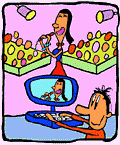The RIAA’s crack team of lawyers chomp on log-sized cigars and clank their three-finger martinis in victory. They have reason to celebrate: They’ve won yet another legal victory against Napster. Yearlong legal battles have raged between Napster, whose proponents argue that they are middlemen providing a service, and the music industry, whose proponents refuse to dance the Funky Duck while their bread and butter gets passed out the back door.
The latest legal decision prohibits the trading of copyrighted material on Napster and makes it Napster’s responsibility to enforce this dictate on its 50 million users. Napster’s not the first to get nailed. Scour.net got axed. MP3.com has been fined into oblivion and turned into an RIAA lackey—that is to say, it has formed strategic alliances with record companies. Executives breathe easy knowing that the shelves at Sam Goody will be safe for $18.99 major-label releases. Metallica members do cannonballs into their gold-lined pools knowing that no one gets to master their puppets for free. Soon Napster will acquiesce and become yet another marketing wing of this month’s hottest bands, and the Era of Free Music will be ushered gently into that good night. Final victory is but a few federal judges away—or so the RIAA would have you think.
In reality, the war against digital distribution of copyrighted material has just begun. And if you can truly see the battlefield, it almost makes you feel sorry for the lawyers.
Napster, Scour, and MP3.com were all easy targets because they had a central location—a top boss you could call on the phone and threaten—meaning the RIAA’s legal guns could anchor out in the harbor and lob lawsuits until one hit. The next generation of file-trading mechanisms, however, will have no central point. No one to sue. No one to put on the cover of Time magazine. There will be no enemy. The enemy will be you.
Last year, a program called Gnutella made its way onto the Internet. It’s got the file-swapping capabilities of Napster, but Gnutella is decentralized. It’s software without a company behind it, floating like a spiderweb on a pond.
Admittedly, Gnutella isn’t quite ready for prime-time piracy. The current version is tricky to use and has torturously slow downloads, but a reportedly more user-friendly Gnutella2 is on the verge of release. A market has been created for free music, and it’s not going away. Like that chopped-up broom in The Sorcerer’s Apprentice, a thousand miniature Napsters may soon be marching up those stairs with buckets of free music, certainly enough to drown every lawyer in the world.
The Browser is a new column written by a revolving cast of technology professionals. Mark Driver is a freelance writer and Web designer from Seattle.







